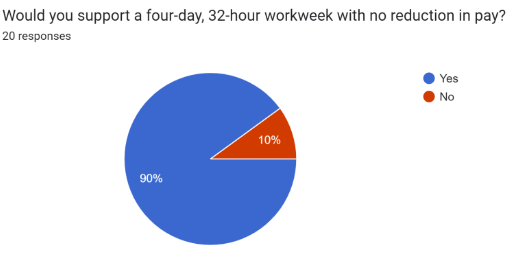The Impact Four-Day Workweeks Have on Mental Health

As more companies transition out of the Covid-19 pandemic, there has been a lot of discussion about the four-day workweek and the impact it could have on mental health.
Non-profit organization 4 Day Week Global recently held a six-month pilot program in which 33 companies tried out a 32-hour, four-day workweek with no reduction in pay. At the conclusion of the program, none of the companies said they plan on switching back to a standard workweek.
A reduction in stress and burnout among employees was cited as a positive impact for businesses involved in the pilot program. Some companies also cited increased revenue during the trial period.
“What this demonstrates is that businesses are better if their staff work less hours,” says Founder of 4 Day Week Global Andrew Barnes.
The results come as businesses are weighing the impact of a four-day schedule as they cope with an increase in remote work alongside the Great Resignation.
4 Day Week Global's pilot program is not the first time a positive impact on employees has been shown as a result of the four-day workweek. Three years ago, Microsoft experimented with a four-day workweek in its Japan subsidiary and found that productivity increased by approximately 40 percent.
A survey released last year by the World Health Organization and International Labour Organization found that working at least 55 hours a week correlates with a 35 percent higher risk of stroke than employees who work 35 to 40 hours each week.
Medical Director at South Oaks Hospital, Dr. Youssef Hassoun, believes that reducing the workweek would not harm companies in terms of productivity.
“The evidence suggests that having longer hours harms individuals,” Hassoun says.

Hofstra students will soon enter the workforce where how many hours a week they work may change depending on the adoption of initiatives of such as a four-day workweek. Photo by Michael Richardson
Hofstra students will soon enter the workforce where how many hours a week they work may change depending on the adoption of initiatives of such as a four-day workweek. Photo by Michael Richardson

Photo by Michael Richardson
Photo by Michael Richardson
The Evolution of the Modern American Workweek
The 40-hour American workweek owes its likeness to businessman Henry Ford, who called for reducing the six-day schedule in 1926. Coming out of the industrial revolution, individuals were on site upwards of 100 hours each week.
In 1940, the amended Fair Labor Standards Act formally reduced the workweek to 40 hours.
A Gallup survey from August found that the average time Americans work each week is 43.1 hours, which is similar to the number prior to the onset of the Covid-19 pandemic.
Earlier this year, Belgium passed legislation that permits workers to choose four-day, 38-hour workweeks, which is more time than organizations such as 4 Day Week Global propose.
H.R.4728, which calls for a 32-hour workweek, has been introduced to the United States House of Representatives but has not been voted on.


Americans Coping With Burnout, Anxiety
In an effort to ensure their small team was well-rested, Illinois-based Young Horses Games implemented a four-day week in July 2021 with no pay reduction. For years, the games industry has been notorious for long working hours and crunch culture.
Particularly towards the end of a game’s development, developers can be expected to work over 70-hour weeks to meet deadlines. The decision has led to some concerns about retaining talent in the industry in the midst of mental health concerns.
Overworking, stress, and anxiety have been cited as one of the most pressing issues facing employees in America and are part of the argument for implementing a four-day, 32-hour workweek.
Michael Richardson speaks with Founder of 4 Day Week Global, Andrew Barnes, on the mental health impact of transitioning to a four-day workweek
The long-term impacts of overworking or anxiety can be overwhelming for employees, according to Hassoun.
“The first thing you do is stop taking care of yourself. And when you stop taking care of yourself you stop addressing any mental health issue that you might be facing,” says Hassoun.
Hassoun adds that overworking can result in excessive worries over job performance.
“You lose track of where to draw the line, your ability to establish boundaries between home and work kind of gets reduced, and you start feeling less and less meaningful,” adds Hassoun.
Hassoun believes that implementing a shorter workweek can alleviate some mental health concerns by decreasing fatigue and burnout.
“More importantly there is some evidence to suggest that [a shortened workweek] enhances life expectancy,” adds Hassoun.

Survey that was taken among 20 individuals for the publication of this story on whether they would support a four-day, 32-hour workweek with no reduction in pay. The results showed that 90 percent of respondents favored the change, whereas 10 percent would not.
Survey that was taken among 20 individuals for the publication of this story on whether they would support a four-day, 32-hour workweek with no reduction in pay. The results showed that 90 percent of respondents favored the change, whereas 10 percent would not.
Andrew Barnes also thinks there are mental health benefits to a four-day, 32-hour workweek.
“What this does is it provides that safety valve for people to be able to decompress,” says Barnes. “That in turn then leads to not just better work-life balance but actually better balance inside yourself as a human being.”
“Not only can you do this with no loss of productivity,” adds Barnes, “but there are in fact material benefits to your employees, to society, to the environment, and they flow through to things like health.”
At the same time, Barnes does not think that a four-day, 40-hour workweek would be beneficial to employees as it would increase fatigue and consequently reduce production. Barnes also says that fully remote work impacts mental health by limiting human interaction.
Criticisms of the Four-Day Workweek
As more companies weigh the impact of transitioning to a four-day workweek, James R. Bailey, who is the Professor and Hochberg Fellow of Leadership Development at the George Washington University School of Business, believes the change is unfeasible in the modern American landscape.
“We’ve got it really well at 40 hours a week in nice, comfortable, atmosphere-control environments,” Bailey says. “There’s no reason to be complaining about 40 hours a week.”
Bailey and Hassoun agree that it is unlikely the four-day workweek would be feasible in certain sectors, such as health services and accounting, where employees work more than 40 hours a week on average.
“One of the concerns is that you might consolidate the five-day workweek in a four-day workweek and that would be the worst thing that can happen simply because you are essentially not protecting outside of work ‘work’,” adds Hassoun.
Andrew Barnes says that although there are obstacles to implementing a four-day workweek abroad, it can be done.
“The leadership teams have forgotten that actually there is a way to do things better and you actually have to bring people along on the journey,” Barnes says.
For companies to ensure the mental health of their employees, the office needs to change, according to Bailey.
“What we have to do is make the office a place where somebody wants to come back to,” Bailey says. “You’ve got to be able to express the advantages of it, that it's actually a win-win.”
